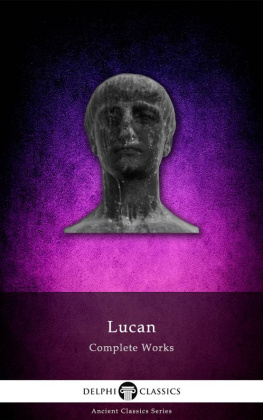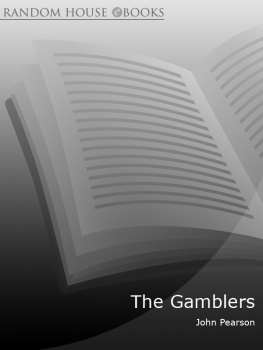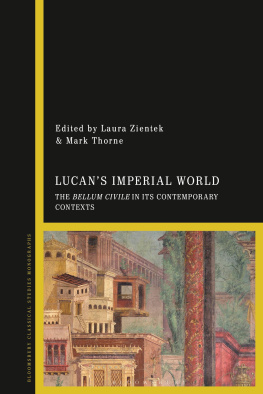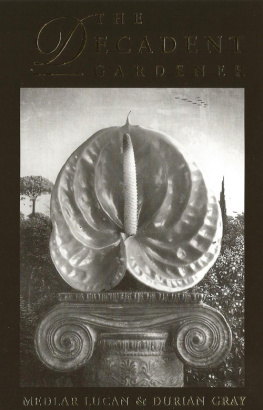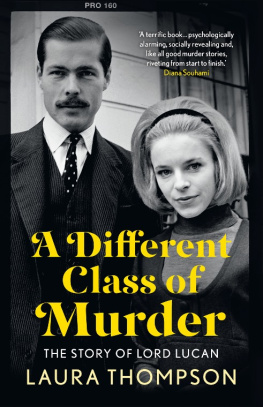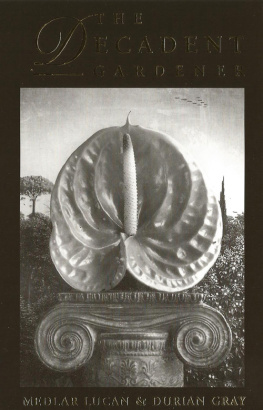Lucan - Complete Works of Lucan
Here you can read online Lucan - Complete Works of Lucan full text of the book (entire story) in english for free. Download pdf and epub, get meaning, cover and reviews about this ebook. year: 2015, publisher: Delphi Classics, genre: Romance novel. Description of the work, (preface) as well as reviews are available. Best literature library LitArk.com created for fans of good reading and offers a wide selection of genres:
Romance novel
Science fiction
Adventure
Detective
Science
History
Home and family
Prose
Art
Politics
Computer
Non-fiction
Religion
Business
Children
Humor
Choose a favorite category and find really read worthwhile books. Enjoy immersion in the world of imagination, feel the emotions of the characters or learn something new for yourself, make an fascinating discovery.
- Book:Complete Works of Lucan
- Author:
- Publisher:Delphi Classics
- Genre:
- Year:2015
- Rating:4 / 5
- Favourites:Add to favourites
- Your mark:
- 80
- 1
- 2
- 3
- 4
- 5
Complete Works of Lucan: summary, description and annotation
We offer to read an annotation, description, summary or preface (depends on what the author of the book "Complete Works of Lucan" wrote himself). If you haven't found the necessary information about the book — write in the comments, we will try to find it.
Complete Works of Lucan — read online for free the complete book (whole text) full work
Below is the text of the book, divided by pages. System saving the place of the last page read, allows you to conveniently read the book "Complete Works of Lucan" online for free, without having to search again every time where you left off. Put a bookmark, and you can go to the page where you finished reading at any time.
Font size:
Interval:
Bookmark:

The Complete Works of
LUCAN
(39 AD 65 AD)

Contents

Delphi Classics 2014
Version 1

The Complete Works of
LUCAN

By Delphi Classics, 2014
Complete Works of Lucan
First published in the United Kingdom in 2014 by Delphi Classics.
Delphi Classics, 2014.
All rights reserved. No part of this publication may be reproduced, stored in a retrieval system, or transmitted, in any form or by any means, without the prior permission in writing of the publisher, nor be otherwise circulated in any form other than that in which it is published.
Delphi Classics
is an imprint of
Delphi Publishing Ltd
Hastings, East Sussex
United Kingdom
Contact: sales@delphiclassics.com
www.delphiclassics.com

Crdoba (Corduba), Andalusia, Spain Lucans birthplace

Roman ruins in Cordoba archaeological site of Cercadilla including the remains of one of Maximians palaces

Lucans sole surviving work, the epic poem De Bello Civili , recounts the civil war between Julius Caesar and the forces of the Roman Senate, led by Pompey the Great. One of the poems other titles, The Pharsalia , refers to the Battle of Pharsalus (48 BC), the climatic event of the seventh book, which occurred near Pharsalus, Thessaly, in northern Greece, when Caesar decisively defeated Pompey. The poem is widely considered to be among the most accomplished works of epic poetry from the Silver Age of Latin literature.
It is believed that the epic was begun circa 61 AD and several books were in circulation before the Emperor Nero and Lucan had a bitter disagreement. In spite of Neros prohibition against any publication of his poetry, Lucan continued to work on De Bello Civili and it was left unfinished when he was compelled to commit suicide as part of the Pisonian conspiracy in 65 AD. A total of ten books were written and all survive, with the final book breaking off abruptly following a description of Caesars arrival in Egypt.
The first book opens with a brief introduction that laments the fate of Romans fighting Romans in a civil war, with an ostensibly flattering dedication to Nero. The main narrative then begins, with Julius Caesar being introduced in northern Italy. Despite an urgent plea from the Roman Senate to lay down his arms, Caesar crosses the Rubicon, rallying his troops and marching south to Rome, joined by Curio on his way. The book culminates with panic in the city, foreboding portents and visions of the tragedies to come.
Many of the real-life characters are portrayed throughout the poem in unflattering and often very flawed and unattractive guises. Caesar is depicted as a cruel despot with a vindictive streak, while Pompey appears weak and uninspiring. Far from glorious, the battle scenes are presented as realistic portrayals of bloody horror, where nature is ravaged to build terrible siege engines and wild animals tear mercilessly at the flesh of the dead. The only exception to the generally bleak portrayals is Cato, who stands alone, representing his Stoic ideal and the fallen Republic, in the face of a dangerous world seemingly turned insane.
Nevertheless, after the Battle of Pharsalus, Pompeys character transforms, becoming instead a stoic martyr-like figure, who is calm in the face of certain death, as he arrives in Egypt and in the ninth book he receives from the poet a virtual canonisation. Lucans favouring of Stoic and Republican principles is in sharp contrast to the ambitious and imperial Caesar, who becomes an even greater tyrant after the decisive battle, clearly serving as a parallel to Nero.
Like most poets of the time, Lucan received the rhetorical training common to upper-class young Roman men. The suasoria a school exercise where students wrote speeches advising an historical figure on a course of action no doubt inspired Lucan to compose some of the speeches found in the text. Lucans poetic style is notably influenced by Ovids Metamorphoses as he presents his narrative as a series of discrete episodes often without any transitional or scene-changing lines and, of course, Virgils grand epic Aeneid . Lucan frequently appropriates ideas from Virgils poem, inverting them to undermine their original purpose. For example, the scene narrating Sextus visit to the Thracian witch Erichtho is influenced by Aeneas descent into the underworld, but where Virgils description highlights optimism toward the future glories of Rome under Augustan rule, Lucan utilises the scene to present bitter pessimism concerning the loss of liberty under the coming Empire (Neros rule).
De Bello Civili was popular soon after its first publication and it remained a school text in late antiquity and during the Middle Ages. Today, over 400 manuscripts survive and its interest to the court of Charlemagne is demonstrated by the existence of five complete manuscripts from the ninth century. Interestingly, Dante includes Lucan among other classical poets in the first circle of the Inferno and the Renaissance poet draws on material from De Bello Civili in his Divine Comedy.

Gaius Julius Caesar (100 BC44 BC)

Gnaeus Pompeius Magnus (106 BC48 BC), Pompey the Great, was a military and political leader of the late Roman Republic. Pompeys immense success as a general while still young enabled him to advance directly to his first consulship without meeting the normal requirements for office.

Marcus Porcius Cato Uticensis (95 BC-46 BC), commonly known as Cato the Younger to distinguish him from his great-grandfather Cato the Elder, was a politician and statesman in the late Roman Republic and a follower of the Stoic philosophy. A noted orator, he is remembered for his stubbornness and tenacity when opposed to Julius Caesar, as well as his immunity to bribes, his moral integrity and his aversion for the corruption of the time.

Caesar Crossing the Rubicon by Tancredi Scarpelli a key early event of the epic poem

Font size:
Interval:
Bookmark:
Similar books «Complete Works of Lucan»
Look at similar books to Complete Works of Lucan. We have selected literature similar in name and meaning in the hope of providing readers with more options to find new, interesting, not yet read works.
Discussion, reviews of the book Complete Works of Lucan and just readers' own opinions. Leave your comments, write what you think about the work, its meaning or the main characters. Specify what exactly you liked and what you didn't like, and why you think so.

